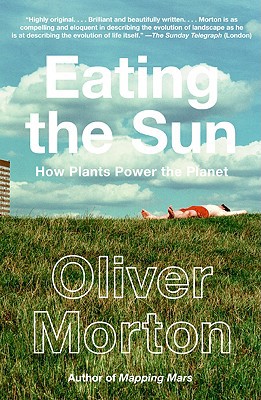

| EATING THE SUN How Plants Power the Planet Oliver Morton New York: HarperCollins, December 2008 |
Rating: 5.0 High |
|||
| ISBN-13 978-0-00-716364-9 | ||||
| ISBN 0-00-716364-9 | 460pp. | HC/GSI | $28.95 | |
For most of human history, it was believed that nothing humans could do would make any significant impact on the land they dwelled upon. That belief persisted even after we learned that the land was in fact the surface of a spinning planet — and it was generally correct. But even then it was not strictly correct. Today, by the technical definition of power, as the table below illustrates, human civilization approaches the levels that maintain Earth's ecosystems. Population studies indicate that there will be nine billion humans on Earth sometime during this century. In the hypothetical case that every one of them enjoyed the lifestyle of a typical American, their aggregate power consumption would more than double that which currently drives NPP: the net primary productivity of Earth's ecosystem.
That is to say that the force that drives our crops, our forests, the many kinds of land animals, every oyster purifying our bays and rivers, and the whales and fish that swim in our waters, and the tiny lifeforms they feed upon, may soon be surpassed by the force that drives our civilization. Quite aside from what we do with that power, the inevitable fact that it turns to heat could have disruptive effects at that level.
By the broader definition of power as the ability to destroy things, we have already gained the power to dramatically alter the land we live on with earth-moving machines — and with the power of the atom we can eradicate entire cities. It is not impossible that we might, if consumed by madness, eradicate all life more advanced than insects. We truly have entered the Anthropocene, the age when human intelligence controls1 the evolution of Earth's surface and the life upon it. We must accept the responsibility this power imposes on us.
| Typical Power Levels Produced or Consumed by Various Events or Activities1 | ||
|---|---|---|
| Resting human | 80 to 100 W | |
| Racing human | 500 W | |
| Human civilization | 13,000,000,000,000 W | |
| Heat from Earth's core | 40,000,000,000,000 W | |
| Mount St. Helens eruption (1989) | 50,000,000,000,000 W | |
| Ecosystem net primary productivity (NPP) | Sea: | 60,000,000,000,000 W |
| Land: | 70,000,000,000,000 W | |
| Human share of NPP | Sea: | 5,000,000,000,000 W |
| Land: | 30,000,000,000,000 W | |
| Power consumption of nine billion people at American lifestyle | 100,000,000,000,000 W | |
| Drop in heat of evaporation due to deforestation | 240,000,000,000,000 W | |
| Indian Ocean tsunami (2004) | 2,000,000,000,000,000 W | |
| Power Earth receives from Sun | 170,000,000,000,000,000 W | |
The above table is drawn from information on pages 348-357. Some things to notice are:
Yes, there are areas in which we should learn to lighten the load we place on the environment. But there are others where strengthening the environment's load-bearing capacity has to be seen as a plausible alternative. We will soon be eight billion people. We will want food, and we will want the products of energy-intensive industry. We will want to move around the world which is our home and our principal source of wonder. We will need a healthy biosphere to keep the biogeochemical cycles of the world turning as we do so. We have to take those desires as givens, and arrange the world to fit them to the best of our capacity. We can oppose current patterns of intensive agriculture as long as we find other ways to feed people. We can constrict fossil-fuel use as long as we don't restrict our fellow humans to poverty as we do so. We can't let a romantic idea that nature should be free to carry on regardless dominate our thinking; nature is everywhere under our influence already. *
* * We are on the flight deck, and we are alone. We are at the controls, and we have no option but to use them. And we know where we want to go. The fact that we have only a dim idea of how to fly means we must act carefully and thoughtfully, not that we must not act." – Pages 392-3 |

 To contact Chris Winter, send email to this address.
To contact Chris Winter, send email to this address.